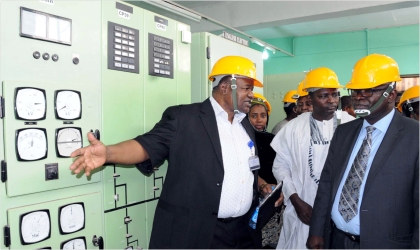Business
Expert Wants TCN Decentralisation To Attract Investors

Towards proffering solution to the perennial collapse of the national grid, the co-founder of PUTTRU, Monica Maduekwe, has called for an urgent decentralisation of the activities of the Transmission Company of Nigeria (TCN).
PUTTRU, an African digital platform that connects energy companies in the continent to global financiers, stated this in a recent statement made available to The Tide’s source.
According to the statement, Maduekwe canvassed an urgent decentralisation of the activities of the TCN, after enacting the necessary laws currently being promoted in the ongoing constitutional reforms.
She stated that it would not only boost investments in the sector, but also help states with such capacities to broaden their energy potentials.
The platform decried the huge losses to the economy on account of poor electricity, saying that legislation in this regard would be a game-changer in the electricity sector.
“In Nigeria, the function of planning and dispatching electricity from power generators feeding electricity into the national grid is centralised and done by a single system operator, the TCN, who is also the transmission service provider.
“Nigeria currently has the capacity to generate more electricity than is made available to consumers”, the statement read in part.
It continued that “in January, this year, Nigerians were made aware that in 2021, although having an available capacity of 6,336.52 MW, only 4,118.98 MW was fed to the national grid. From 2015 to 2021, it is reported that generators in Nigeria have lost about N1.632tn
“Due to challenges in our transmission and distribution infrastructure, power generators are compelled to reduce their capacity, or the electricity produced is rejected by the system operator.
“This situation is hampering investment across Nigeria’s power sector. The Bill obviously seeks to enable states to bypass these systemic challenges. And, if passed, such a Bill will indeed do so for states that have a clear strategy and managerial capacity to execute this, thus increasing electricity available to those states.
“However, this may lead to revenue losses for some incumbent market participants, including the national grid system operator – but, considering the new market opportunities this could create for TCN; this structure presents a more positive outlook than negative for the public entity, it stated
The statement explained further that if passed to law, the Bill “could be the game-changer for Nigeria’s power sector as it could fast-track, and lead to, a more competitive market structure as envisaged in the market rules for the Nigerian Electricity Supply Industry.
“Although the market still exhibits features of the transitional stage, in the medium-term market, Nigeria will implement a balancing market where electricity will be traded in a spot market.
“A reliable transmission and distribution system would be essential for this to exist and having state-level markets, and simplification by decentralisation, could enable the country to tackle the perennial system constraints stifling the power sector,” she said.
Business
PENGASSAN Tasks Multinationals On Workers’ Salary Increase

Business
SEC Unveils Digital Regulatory Hub To Boost Oversight Across Financial Markets

Business
NAFDAC Decries Circulation Of Prohibited Food Items In markets …….Orders Vendors’ Immediate Cessation Of Dealings With Products

Importers, market traders, and supermarket operators have therefore, been directed to immediately cease all dealings in these items and to notify their supply chain partners to halt transactions involving prohibited products.
The agency emphasized that failure to comply will attract strict enforcement measures, including seizure and destruction of goods, suspension or revocation of operational licences, and prosecution under relevant laws.
The statement said “The National Agency for Food and Drug Administration and Control (NAFDAC) has raised an alarm over the growing incidence of smuggling, sale, and distribution of regulated food products such as pasta, noodles, sugar, and tomato paste currently found in markets across the country.
“These products are expressly listed on the Federal Government’s Customs Prohibition List and are not permitted for importation”.
NAFDAC also called on other government bodies, including the Nigeria Customs Service, Nigeria Immigration Service(NIS) Standards Organisation of Nigeria (SON), Nigerian Ports Authority (NPA), Nigerian Maritime Administration and Safety Agency (NIMASA), Nigeria Shippers Council, and the Nigeria Agricultural Quarantine Service (NAQS), to collaborate in enforcing the ban on these unsafe products.
-

 Politics3 days ago
Politics3 days agoWhy Reno Omokri Should Be Dropped From Ambassadorial List – Arabambi
-

 Sports3 days ago
Sports3 days agoNigeria, Egypt friendly Hold Dec 16
-

 Oil & Energy3 days ago
Oil & Energy3 days agoNCDMB Unveils $100m Equity Investment Scheme, Says Nigerian Content Hits 61% In 2025 ………As Board Plans Technology Challenge, Research and Development Fair In 2026
-

 Politics3 days ago
Politics3 days agoPDP Vows Legal Action Against Rivers Lawmakers Over Defection
-

 Sports3 days ago
Sports3 days agoNSC hails S’Eagles Captain Troost-Ekong
-

 Politics3 days ago
Politics3 days agoRIVERS PEOPLE REACT AS 17 PDP STATE LAWMAKERS MOVE TO APC
-

 Sports3 days ago
Sports3 days agoMakinde becomes Nigeria’s youngest Karate black belt
-

 Sports3 days ago
Sports3 days agoFRSC Wins 2025 Ardova Handball Premier League

